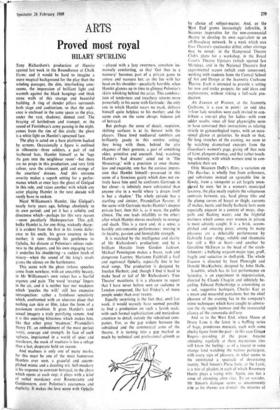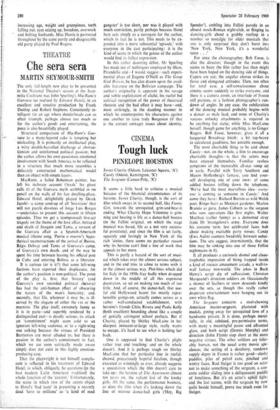Proved- most royal
ARTS
HILARY SPURLING
Tony Richardson's production of Hamlet opened last week in the Roundhouse at Chalk Farm; and it would be hard to imagine a more magical background for the play than the winding passages, the dim, -interlocking ante- rooms, the impression of brilliant light, and warmth against the black hangings and thick stone walls of this strange and beautiful building. A ring of slender pillars surrounds both stage and auditorium, so that the audi- ence is enclosed in the same space as the play, under the vast, shadowy, domed roof. The braying of kettledrum and trumpet, or the sound-of Fortinbras's army passing in the night, comes from the rim of this circle; the ghost is a white light on Hamlet's upturned face. Tony Richardson's production of Hamlet opened last week in the Roundhouse at Chalk Farm; and it would be hard to imagine a more magical background for the play than the winding passages, the dim, -interlocking ante- rooms, the impression of brilliant light, and warmth against the black hangings and thick stone walls of this strange and beautiful building. A ring of slender pillars surrounds both stage and auditorium, so that the audi- ence is enclosed in the same space as the play, under the vast, shadowy, domed roof. The braying of kettledrum and trumpet, or the sound-of Fortinbras's army passing in the night, comes from the rim of this circle; the ghost is a white light on Hamlet's upturned face.
The play is acted on a bare platform backed by screens. Occasionally a figure is outlined in silhouette—three soldiers, a pair of red feathered hats, Hamlet himself as he 'lugs the guts into the neighbour room'—but there are no props in this production, and very little colour, save the crimson, gold and orange of the courtiers' dresses. And this extreme severity makes a superb setting for a perfor- mance which at once lays the ghost of Gielgud in this role, and raises another with which any actor playing Hamlet in the next decade will surely have to reckon.
Nicol Williamson's Hamlet, like Gielgud's nearly forty years ago, belongs absolutely to its own period; and yet it has a solidity and directness which—perhaps for this very reason —seem peculiarly Shakespearian. This Aall, bulky Hamlet is, for one thing, wickedly sharp: it is evident from the first in his ironic defer- ence to his uncle, his grave courtesy to his mother; it runs through his gentleness to Ophelia, his distaste at Polonius's odious rude- ness to the players, and his own engaging tact; it underlies his shuddering—a sudden lurch of misery—when the sound of the king's revels grates the silence on the battlements.
This scene with the ghost (whose speeches come from nowhere, with an unearthly beauty. in Mr Williamson's own voice) has a fearful urgency and pain. The word 'revenge' lingers in the air, and it is neither fear nor weakness which 'puzzles the will,' still less excessive introspection: rather a fastidious sensitivity which, confronted with an ulcerous place that nothing can skin or film, takes the form of a passionate revulsion. It gives Hamlet's rank sexual imagery a truly petrifying venom. And it is this sneering bitterness which makes him, like that other great 'madman,' Pirandello's Henry IV, an embodiment of the most perfect sanity, courage and strength. In face of such ugliness, imprisoned in a world of spies and murderers, the mask of madness is less a refuge than a last, desperate hold on reason.
And madness is only one of many masks, for this must be one of the most humorous Hamlets ever seen, a graceful and accom- plished mimic and a dazzling wit. Self-mockery is his response to constant betrayal, to the abyss which opens at each step; it plays with a kind of veiled mordancy over Rosencrantz and Guildenstern, over Polonius's coarseness and duplicity. It makes the love scene with Opbelia —played with a lazy sweetness. somehow im- mensely comforting, so that 'Get thee to a nunnery' becomes part of a private game to amuse and reassure her, as she lies with her head-on his shoulder—peculiarly horrible, when Hamlet glances up in time to glimpse Polonius's skirts whisking behind the arras. This combina- tion of tenderness and treachery returns more powerfully in his scene with Gertrude: the only one in which Hamlet wears no mask, delivers himself quite helpless to his mother; and the scene ends on the same abrupt, hideous jolt of betrayal.
But perhaps the sense of deceit, suspicion, shifting surfaces is at its fiercest with the players. These lewd mediaeval tumblers are brilliantly gaudy in this sombre setting; they bring with them, behind the airy elegance of their gestures, a gust of something older, primitive and uncouth. And, watching Hamlet's 'bad dreams' acted out in 'The Mousetrap,' with a precision at once shame- less and exquisite, one has the curious impres- sion that Hamlet himself—possessed in this scene of a ferocious gaiety which does not en- tirely leave him until he confronts Gertrude in her closet—is infinitely more substantial than anyone else in a world where 'a dream itself is but a shadow.' The whole episode has a startling and sinister, Pirandellian flavour; if the scene with Gertrude marks Hamlet's deepest private hurt, then this is, as it were, the public climax. The one leads infallibly to the other; after which Hamlet moves resolutely to revenge and death. This is a stern and, in a sense, a harshly anti-romantic performance: moving in its lucidity, passion and formidable strength.
It is matched by the intelligence and clarity of Mr Richardson's production; and by a brilliant Horatio from Gordon Jackson. Michael Pennington makes a brave, rash and dangerous Laertes; Marianne Faithfull a frail and equivocal Ophelia, especially fine in her mad songs. The production is designed by Jocelyn Herbert; and, though I find it hard to make head or tail of Mr Richardson's 'Free Theatre' manifesto, it is a pleasure to report that I have never before seen an audience in London composed, like last Friday's, of more people under than over twenty.
Equally surprising is the fact that, until last week, it would scarcely have seemed possible to find a production on such a lavish scale, with such formal sophistication and meticulous attention to detail, outside the subsidised com- panies. For, as the gap widens between the subsidised and the commercial arms of the theatre, it is turning into a gap marked as much by technical and professional aplomb as by choice of subject-matter. And, as the West End grows idcreasingly inflexible, it &comes imperative for the non-commercial theatre to develop its own equivalent to an off=Broadway network. In a week which sees Free Theatre's spectacular debut, other stirrings tray be noted: in the Hampstead Theatre Club's plans for a workshop, in the Royal Court's Theatre Upstairs (which opened last Monday), and in the National Theatre's first experimental season (which ends tomorrow), working with students from the Central School at Art and Design at the Jeannetta Cochrane eatre. Each is intended to provide a setting for new and tricky projects, for odd ideas and explorations, without risking a full-scale pro- duction.
An Evasion of Women, at the Jeannetta Cochrane, is a case in point: an odd idea *four lady novelists were each invited to cod- tribute a one-act play for ladies—with even adder results, since all four playwrights seem to have construed their instructions as relating strictly to gynaecological topics, with an occa- sional glance at geriatrics. So much so that, ftr long stretches of the evening, we seem to bt watching dramatised excerpts from the Cuardian's women's page, giving off that note of faint, plangent dismay, and that rather touch- ing solemnity, with which women tend to con- template their sex.
Only Maureen Duffy's Rites, a variation on The Bacchae, is wholly free from artlessness, std substitutes instead an agreeable line in bawdy, from a viewpoint as yet largely unex- *red by men. Set in a women's municipal lavatory, the play neatly exploits the voluptuous contrasts between, say, hard glossy tiles and the plump curves of breast or thigh; currents Of malice, hectic and finally barbaric lusts seem especially piquant in a context of mops, slop- pails and flushing water; and the frightful matiness which comes over women in private is most adroitly caught. It is a brisk, accom- plished and amusing piece; among its many pleasures are a delectable performance by Gabrielle Laye—dingy, voluble and rheumatic but still a flirt at heart—and another by Geraldine McEwan as the head of the estab- lishment: a bullying sergeant-major type, gruff, fragile and seductive in shell-pink. The whole Evasion is directed by Joan Plowright and Donald MacKechnie, designed by John Halle.
Scrabble, which has its last performance on Saturday, is an experiment in improvisation, directed by Claude Chagrin and infinitely be- guiling. Edward Petherbridge is astonishing as a sad, suggestive harlequin, Charles Kay as a mean and mournful pantaloon; but the chief pleasure of the evening lies in the company's mime techniques which have caught to admira- tion the sly supple humour and the resourceful pliancy of the commedia dell'arte.
And so to the West End, where Mane at Drury Lane is the latest in a baffling series of hu,ge, ponderous musicals, each with some plucky figure from the past—in this case Ginger Rogers—presiding at the prow. Anyone attending regularly at these mysterious rites will know the feeling: as of a tourist in some strange land watching the natives participate, with every sign of pleasure, in what seems to the uninitiated a spectacle of devastating inanity. Neil Simon's Plaza Suite, at the Lyric, is a trio of playlets in each of which Rosemary Harris plays a trying wife. Again, one has a sense of attending alien rites. To an outsider, Mr Simon's dialogue seems as uncommonly trite as his themes are dismal : the miseries of
increasing age, weight and grumpiness, teeth falling out, eyes seizing up, boredom, overwork and bolting husbands. Miss Harris is partnered throughout by the same portly and disagreeable old party played by Paul Rogers.



































 Previous page
Previous page